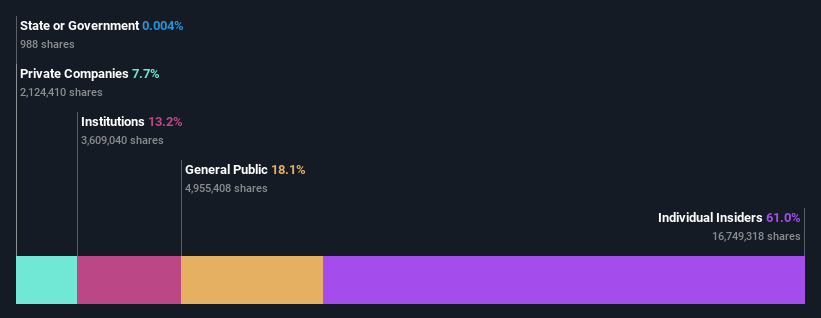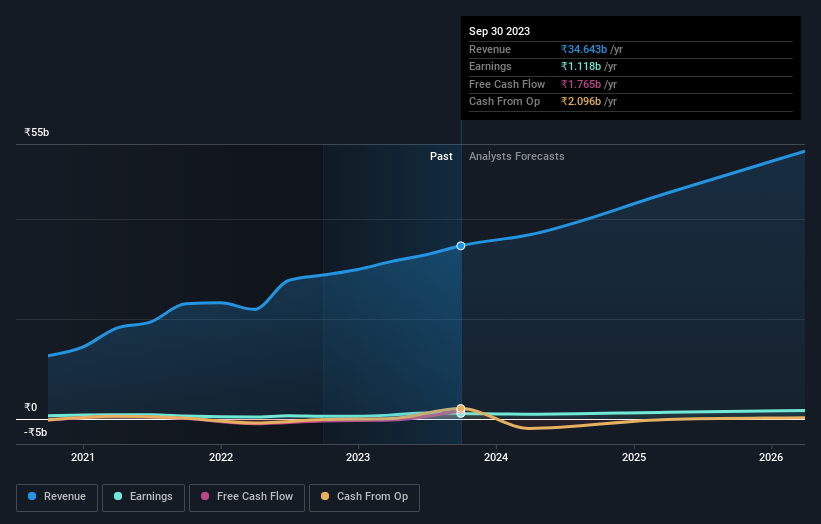Stock Analysis
- India
- /
- Specialty Stores
- /
- NSEI:THANGAMAYL
Thangamayil Jewellery Limited's (NSE:THANGAMAYL) largest shareholder, Co-Chief Executive Officer Narayanan Kumar sees holdings value fall by 12% following recent drop

Key Insights
- Significant insider control over Thangamayil Jewellery implies vested interests in company growth
- A total of 3 investors have a majority stake in the company with 58% ownership
- 13% of Thangamayil Jewellery is held by Institutions
To get a sense of who is truly in control of Thangamayil Jewellery Limited (NSE:THANGAMAYL), it is important to understand the ownership structure of the business. With 61% stake, individual insiders possess the maximum shares in the company. Put another way, the group faces the maximum upside potential (or downside risk).
As market cap fell to ₹34b last week, insiders would have faced the highest losses than any other shareholder groups of the company.
Let's take a closer look to see what the different types of shareholders can tell us about Thangamayil Jewellery.
View our latest analysis for Thangamayil Jewellery

What Does The Institutional Ownership Tell Us About Thangamayil Jewellery?
Many institutions measure their performance against an index that approximates the local market. So they usually pay more attention to companies that are included in major indices.
We can see that Thangamayil Jewellery does have institutional investors; and they hold a good portion of the company's stock. This suggests some credibility amongst professional investors. But we can't rely on that fact alone since institutions make bad investments sometimes, just like everyone does. When multiple institutions own a stock, there's always a risk that they are in a 'crowded trade'. When such a trade goes wrong, multiple parties may compete to sell stock fast. This risk is higher in a company without a history of growth. You can see Thangamayil Jewellery's historic earnings and revenue below, but keep in mind there's always more to the story.

Hedge funds don't have many shares in Thangamayil Jewellery. From our data, we infer that the largest shareholder is Narayanan Kumar (who also holds the title of Co-Chief Executive Officer) with 20% of shares outstanding. Its usually considered a good sign when insiders own a significant number of shares in the company, and in this case, we're glad to see a company insider play the role of a key stakeholder. Meanwhile, the second and third largest shareholders, hold 19% and 19%, of the shares outstanding, respectively. Interestingly, the second and third-largest shareholders also happen to be the Co-Chief Executive Officer and Chairman of the Board, respectively. This once again signifies considerable insider ownership amongst the company's top shareholders.
To make our study more interesting, we found that the top 3 shareholders have a majority ownership in the company, meaning that they are powerful enough to influence the decisions of the company.
While studying institutional ownership for a company can add value to your research, it is also a good practice to research analyst recommendations to get a deeper understand of a stock's expected performance. While there is some analyst coverage, the company is probably not widely covered. So it could gain more attention, down the track.
Insider Ownership Of Thangamayil Jewellery
The definition of an insider can differ slightly between different countries, but members of the board of directors always count. Management ultimately answers to the board. However, it is not uncommon for managers to be executive board members, especially if they are a founder or the CEO.
I generally consider insider ownership to be a good thing. However, on some occasions it makes it more difficult for other shareholders to hold the board accountable for decisions.
Our most recent data indicates that insiders own the majority of Thangamayil Jewellery Limited. This means they can collectively make decisions for the company. So they have a ₹21b stake in this ₹34b business. Most would be pleased to see the board is investing alongside them. You may wish todiscover (for free) if they have been buying or selling.
General Public Ownership
The general public-- including retail investors -- own 18% stake in the company, and hence can't easily be ignored. This size of ownership, while considerable, may not be enough to change company policy if the decision is not in sync with other large shareholders.
Private Company Ownership
Our data indicates that Private Companies hold 7.7%, of the company's shares. Private companies may be related parties. Sometimes insiders have an interest in a public company through a holding in a private company, rather than in their own capacity as an individual. While it's hard to draw any broad stroke conclusions, it is worth noting as an area for further research.
Next Steps:
While it is well worth considering the different groups that own a company, there are other factors that are even more important. For example, we've discovered 2 warning signs for Thangamayil Jewellery that you should be aware of before investing here.
Ultimately the future is most important. You can access this free report on analyst forecasts for the company.
NB: Figures in this article are calculated using data from the last twelve months, which refer to the 12-month period ending on the last date of the month the financial statement is dated. This may not be consistent with full year annual report figures.
Valuation is complex, but we're helping make it simple.
Find out whether Thangamayil Jewellery is potentially over or undervalued by checking out our comprehensive analysis, which includes fair value estimates, risks and warnings, dividends, insider transactions and financial health.
View the Free AnalysisHave feedback on this article? Concerned about the content? Get in touch with us directly. Alternatively, email editorial-team (at) simplywallst.com.
This article by Simply Wall St is general in nature. We provide commentary based on historical data and analyst forecasts only using an unbiased methodology and our articles are not intended to be financial advice. It does not constitute a recommendation to buy or sell any stock, and does not take account of your objectives, or your financial situation. We aim to bring you long-term focused analysis driven by fundamental data. Note that our analysis may not factor in the latest price-sensitive company announcements or qualitative material. Simply Wall St has no position in any stocks mentioned.
About NSEI:THANGAMAYL
Thangamayil Jewellery
Thangamayil Jewellery Limited operates a chain of retail jewelry stores in India.
Exceptional growth potential with solid track record and pays a dividend.

